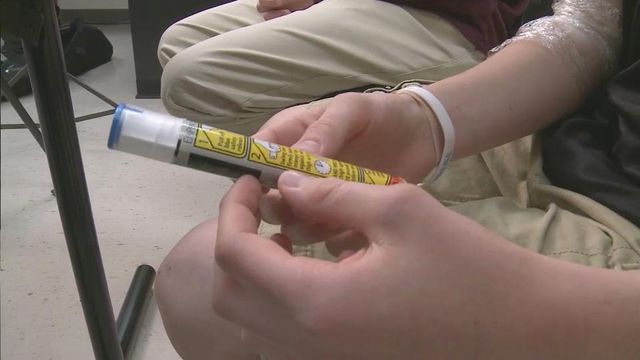Law would expand EpiPen access in schools
The future looks positive for public school students with severe food allergies. Proposed legislation would provide for EpiPens, even for those who haven't been diagnosed.
Posted — UpdatedNorth Carolina legislators are considering a bill of interest to parents of children with severe food or bee sting allergies. The act requires public school systems to place emergency epinephrine auto-injectors in each school to make the fast-acting treatment available even to students without a diagnosed allergy.
The bill, which has passed the House and is up for discussion in a state Senate committee, would require that schools stock a minimum of two EpiPens and train personnel to use them.
The North Carolina bill would mimic a Virginia law, which requires that all public schools have some emergency supply of the medication for use on any child.
Patrick Campfield, 12, of Fredericksburg, Va., knows the benefits of having the EpiPen at hand.
"We've known I've been allergic to peanuts since I was 2," he said.
Even food cross-contaminated by peanuts could trigger a severe reaction.
"His face becomes really puffy, eyes puffed up, everything is puffed up," said his father, Ray Campfield.
Patrick is participating in an immunotherapy study at the University of North Carolina using drops under the tongue, small doses of peanut protein to build up his tolerance.
In the meantime, Patrick keeps an epinephrine auto-injector on him at all times, and he knows how to use it.
"I'm supposed to put it right here on my thigh," he said.
Dr. Edwin Kim, a researcher in the UNC study, knows the value of having epinephrine on hand.
"Maybe there is an EpiPen at the school, but it's labeled under a certain child's name and this other one who may be getting sick doesn't have access to it," he said.
Once anaphylactic shock begins, the Campfields know, there's no time to run around a school looking for an EpiPen.
"Seconds count, not minutes," Ray Campfield said.
The future looks positive for kids with severe food allergies. The immunotherapy study program seems to have taken the edge off Patrick's risk, and the legislation offers a level of protection for all students.
• Credits
Copyright 2024 by Capitol Broadcasting Company. All rights reserved. This material may not be published, broadcast, rewritten or redistributed.






